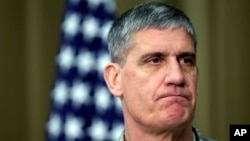PENTAGON —
Twenty years after close to one million people were slaughtered in the Rwandan genocide, U.S. military officials are confident that forces are better positioned to prevent a repeat of such mass slaughter. But, Washington is still concerned about security across the African continent.
Fears run rampant across much of the Central African Republic, where 2,000 people have been killed in ethnic violence since December, and some African peacekeepers already have pulled out.
But U.S. defense officials say the fact that African forces have been able to intervene is a sign things are slowly improving.
“The African forces that now are available that participate in these interventions and those types of things have expanded incredibly in the last 20 years; I mean six nations in Somalia, nine going to 16 in Mali," said General David Rodriguez.
And the commander of the U.S. Africa Command, General David Rodriguez, says American forces also are better positioned to respond, with as many as 6,000 troops on the ground, including some at a forward operating base in Djibouti and trainers on the ground in Uganda, aiding the effort to track and stop warlord Joseph Kony and his Lord’s Resistance Army.
“They continue to get weaker every day, and we’re going to continue to support the efforts of the African Union Regional Task Force to finish this off," he said.
But deep concerns remain about the growing nexus of extremists, especially in northeastern Mali and southwestern Libya. Rodriguez points to the 2013 attack on a gas facility in Ain Amenas, Algeria, where three al-Qaida-linked groups joined forces.
“They’re also transferring things that are very worrisome like the IED technology, and tactics, techniques and procedures," said Rodriguez.
In addition, U.S. defense officials say they and their African partners worry about the flow of extremist fighters to Syria and their eventual return across sometimes porous borders.
But even as U.S. forces draw down from Afghanistan, Deputy Assistant Defense Secretary for African Affairs Amanda Dory says don’t expect a heavier U.S. presence in Africa.
“Our small footprint and targeted support, working with willing partners, fulfills both our own strategic approach and is the way our African partners prefer to work with us," said Dory.
However, U.S. officials do say they are considering ways to improve military capabilities, especially in West Africa.
Fears run rampant across much of the Central African Republic, where 2,000 people have been killed in ethnic violence since December, and some African peacekeepers already have pulled out.
But U.S. defense officials say the fact that African forces have been able to intervene is a sign things are slowly improving.
“The African forces that now are available that participate in these interventions and those types of things have expanded incredibly in the last 20 years; I mean six nations in Somalia, nine going to 16 in Mali," said General David Rodriguez.
And the commander of the U.S. Africa Command, General David Rodriguez, says American forces also are better positioned to respond, with as many as 6,000 troops on the ground, including some at a forward operating base in Djibouti and trainers on the ground in Uganda, aiding the effort to track and stop warlord Joseph Kony and his Lord’s Resistance Army.
“They continue to get weaker every day, and we’re going to continue to support the efforts of the African Union Regional Task Force to finish this off," he said.
But deep concerns remain about the growing nexus of extremists, especially in northeastern Mali and southwestern Libya. Rodriguez points to the 2013 attack on a gas facility in Ain Amenas, Algeria, where three al-Qaida-linked groups joined forces.
“They’re also transferring things that are very worrisome like the IED technology, and tactics, techniques and procedures," said Rodriguez.
In addition, U.S. defense officials say they and their African partners worry about the flow of extremist fighters to Syria and their eventual return across sometimes porous borders.
But even as U.S. forces draw down from Afghanistan, Deputy Assistant Defense Secretary for African Affairs Amanda Dory says don’t expect a heavier U.S. presence in Africa.
“Our small footprint and targeted support, working with willing partners, fulfills both our own strategic approach and is the way our African partners prefer to work with us," said Dory.
However, U.S. officials do say they are considering ways to improve military capabilities, especially in West Africa.




